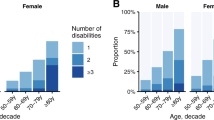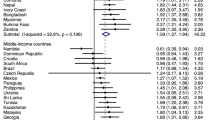Abstract
Objective
Older adults with vision impairment experience high rates of mental health problems, but very few access psychological support. We investigated community and stakeholder perspectives of the barriers and facilitators to participation in mental well-being programs for older adults with vision impairment.
Methods
Adults aged ≥ 50 years with vision impairment (community) were recruited from the client database, and low vision rehabilitation (LVR) professionals (stakeholders) from staff of a LVR provider. Participants completed one-on-one semi-structured interviews, which were designed and analyzed using behavior change theory.
Results
Twenty-nine participants were interviewed; 16 community members and 13 stakeholders. Both groups cited mental health problems as a major concern, with many stakeholders reporting the grief and distress associated with vision loss experienced by their clients as having a negative impact on their mental and physical health. Major barriers to participation in mental well-being programs included a lack of awareness and difficulties accessing such programs, with stakeholders adding that their clients’ lack of insight into their own mental health problems may reduce motivation to participate. Facilitators to participation in programs included the appeal of social interaction and inspirational speakers. An appropriate intervention could overcome these barriers, or enhance participation through education, persuasion, incentivisation, modeling, environmental restructuring, training, and enablement.
Conclusions
While barriers were discussed more than facilitators to participation, there was general support for mental well-being programs. This study provides guidance from stakeholders for the development of mental well-being programs to address mental health problems in the growing number of older adults with vision impairment.
Similar content being viewed by others
Log in or create a free account to read this content
Gain free access to this article, as well as selected content from this journal and more on nature.com
or
References
Bourne RRA, Flaxman SR, Braithwaite T, Cicinelli MV, Das A, Jonas JB, et al. Magnitude, temporal trends, and projections of the global prevalence of blindness and distance and near vision impairment: a systematic review and meta-analysis. Lancet Glob Health. 2017;5:e888–97.
Court H, McLean G, Guthrie B, Mercer SW, Smith DJ. Visual impairment is associated with physical and mental comorbidities in older adults: a cross-sectional study. BMC Med. 2014;12:181.
Foreman J, Keel S, Xie J, cvan Wijngaarden P, Crowston J, Taylor HR, et al. National Eye Health Survey. 2016. https://www.vision2020australia.org.au/resources/national-eye-health-survey-report/.
Evans JR, Fletcher AE, Wormald RP. Depression and anxiety in visually impaired older people. Ophthalmology. 2007;114:283–8.
Nyman SR. Psychosocial issues in engaging older people with physical activity interventions for the prevention of falls. Can J Aging. 2011;30:45–55.
Brody BL, Gamst AC, Williams RA, Smith AR, Lau PW, Dolnak D, et al. Depression, visual acuity, comorbidity, and disability associated with age-related macular degeneration. Ophthalmology. 2001;108:1893–900.
Rovner BW, Casten RJ, Hegel MT, Massof RW, Leiby BE, Ho AC, et al. Improving function in age-related macular degeneration: a randomized clinical trial. Ophthalmology. 2013;120:1649–55.
Casten R, Rovner BW, Leiby BE, Tasman W. Depression despite anti-vascular endothelial growth factor treatment of age-related macular degeneration. Arch Ophthalmol. 2010;128:506–8.
van der Aa HP, van Rens GH, Comijs HC, Bosmans JE, Margrain TH, van Nispen RM. Stepped-care to prevent depression and anxiety in visually impaired older adults–design of a randomised controlled trial. BMC Psychiatry. 2013;13:209.
Holloway E, Sturrock B, Lamoureux E, Hegel M, Casten R, Mellor D, et al. Delivering problem-solving treatment in low-vision rehabilitation: a pilot feasibility study. Rehabil Psychol. 2018;63:349–56.
van der Aa HP, Margrain TH, van Rens GH, Heymans MW, van Nispen RM. Psychosocial interventions to improve mental health in adults with vision impairment: systematic review and meta-analysis. Ophthalmic Physiol Opt. 2016;36:584–606.
Kamga H, McCusker J, Yaffe M, Sewitch M, Sussman T, Strumpf E, et al. Self-care tools to treat depressive symptoms in patients with age-related eye disease: a randomized controlled clinical trial. Clin Exp Ophthalmol. 2017;45:371–8.
Sturrock B. Treating depression in people with vision impairment. 2018. https://www.psychology.org.au/for-members/publications/inpsych/2018/feb/Treating-depression-in-people-with-vision-impairm.
Holloway E, Sturrock B, Lamoureux E, Keeffe J, Hegel M, Casten R, et al. Can we address depression in vision rehabilitation settings? Professionals’ perspectives on the barriers to integrating problem-solving treatment. Disabil Rehabil. 2018;40:287–95.
Michie S, van Stralen MM, West R. The behaviour change wheel: a new method for characterising and designing behaviour change interventions. Implement Sci. 2011;6:42.
Vaismoradi M, Turunen H, Bondas T. Content analysis and thematic analysis: implications for conducting a qualitative descriptive study. Nurs Health Sci. 2013;15:398–405.
Srivastava P, Hopwood N. A practical iterative framework for qualitative data analysis. Int J Qualitative Methods. 2009;8:76–84.
Tong A, Sainsbury P, Craig J. Consolidated criteria for reporting qualitative research (COREQ): a 32-item checklist for interviews and focus groups. Int J Qual Health Care. 2007;19:349–57.
Dillon L, Duffy P, Tiedemann A, Keay L. Acceptability of fall prevention strategies for older people with vision impairment. Int J Orientat Mobil. 2018;9:1–9.
Nyman SR, Dibb B, Victor CR, Gosney MA. Emotional well-being and adjustment to vision loss in later life: a meta-synthesis of qualitative studies. Disabil Rehabil. 2012;34:971–81.
Craig A, Nicholson Perry K, Guest R, Tran Y, Middleton J. Adjustment following chronic spinal cord injury: determining factors that contribute to social participation. Br J Health Psychol. 2015;20:807–23.
Nollett CL, Bray N, Bunce C, Casten RJ, Edwards RT, Hegel MT, et al. High prevalence of untreated depression in patients accessing low-vision services. Ophthalmology. 2016;123:440–1.
Boeschoten RE, Dekker J, Uitdehaag BM, Polman CH, Collette EH, Cuijpers P, et al. Internet-based self-help treatment for depression in multiple sclerosis: study protocol of a randomized controlled trial. BMC Psychiatry. 2012;12:137.
Reinhardt JP, Horowitz A, Cimarolli VR, Eimicke JP, Teresi JA. Addressing depression in a long-term care setting: a phase II pilot of problem-solving treatment. Clin Ther. 2014;36:1531–7.
Haaga DA. Introduction to the special section on stepped care models in psychotherapy. J Consult Clin Psychol. 2000;68:547–8.
Patel V, Weiss HA, Chowdhary N, Naik S, Pednekar S, Chatterjee S, et al. Effectiveness of an intervention led by lay health counsellors for depressive and anxiety disorders in primary care in Goa, India (MANAS): a cluster randomised controlled trial. Lancet. 2010;376:2086–95.
van’t Veer-Tazelaar PJ, van Marwijk HW, van Oppen P, van Hout HP, van der Horst HE, Cuijpers P, et al. Stepped-care prevention of anxiety and depression in late life: a randomized controlled trial. Arch Gen Psychiatry. 2009;66:297–304.
National Institute for Health and Care Excellent (NICE). Common mental health problems: identification and pathways to care. Clinical guideline [CG123]. 2001. https://www.nice.org.uk/guidance/CG123/chapter/1-Guidance#stepped-care.
Acknowledgements
We would like to acknowledge students Rachel Muyco and Aimee Wassermann for conducting many of the semi-structured interviews along with DT. We would also like to acknowledge Kerrie Ren for her assistance with study administration, as well as Guide Dogs NSW/ACT.
Funding
This research was funded by the UNSW Sydney-University of Sydney: Mental Health and Wellbeing—Early Intervention and Prevention (Older People) Seed Funding Scheme.
Author information
Authors and Affiliations
Corresponding author
Ethics declarations
Conflict of interest
The authors declare that they have no conflict of interest.
Additional information
Publisher’s note Springer Nature remains neutral with regard to jurisdictional claims in published maps and institutional affiliations.
Supplementary information
Rights and permissions
About this article
Cite this article
Dillon, L., Tang, D., Liew, G. et al. Facilitators and barriers to participation in mental well-being programs by older Australians with vision impairment: community and stakeholder perspectives. Eye 34, 1287–1295 (2020). https://doi.org/10.1038/s41433-020-0992-z
Received:
Revised:
Accepted:
Published:
Version of record:
Issue date:
DOI: https://doi.org/10.1038/s41433-020-0992-z



